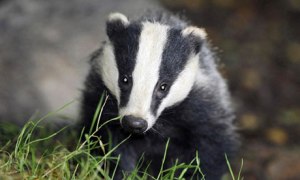
The proposed new extension to the six week badger cull has been defended on the basis that insufficient numbers of the animals in Gloucestershire have presented themselves to the marskmen’s bullets.
This proposal is now under attack from two directions. The chief scientific adviser for Natural England, the body responsible for licensing the cull, has called upon the government to stop the badger cull immediately. According to Damien Carrington writing in the Guardian,
The intervention by David Macdonald, chair of NE’s science advisory committee and one of the UK’s most eminent wildlife biologists, is a heavy blow for the environment secretary, Owen Paterson, and the National Farmers’ Union, who argue that killing badgers to curb tuberculosis in cattle is scientifically justified and necessary.The Badger Trust is also sharpening its knives for fresh legal challenge. Its lawyers at Bindmans have written to Natural England and DEFRA, pointing out that the policy that DEFRA successfully defended in the Trust’s original judicial review , was based on “effectiveness”:
In relation to ‘effectiveness’ specifically, the purpose is to confirm our assumption that controlled shooting will be an effective method to reduce the population of badgers by 70% within 6 weeks.” [bold added] (and see David Hart’s post on those proceedings)Lawyers for the Trust remind us that DEFRA itself “robustly” rejected arguments during the consultation that a longer period should be put in place, precisely because of concerns about the practicability of completing the task within 6 weeks (i.e. the very thing which has now come to pass). What DEFRA said then, was this:
We do not propose to change fundamentally the licence criteria, as they are criteria which the evidence suggests are necessary to realise the overall reduction in TB in cattle in culled areas achieved in the RBCT. The rationale for each of the criteria is explained in the [December 2011] Policy Statement.As the Trust’s letter says, “what has happened now was foreseeable, and foreseen, and did not change DEFRA’s view that a 6 week limit should be set.
”
The problem is, only 30% of the relevant badger population has been killed within the 6 week period in that area – well short of the 70% minimum target which had been identified as “effective”. Now that the licence issued under section 10(2)(a) Protection of Badgers Act 1992 to allow for the culling of badgers over the 6 week pilot period in Gloucestershire has expired, DEFRA is seeking an extension of 8 weeks’ shooting. But they are not entitled to do that, say the Trust.
The cull has thus met its purpose in testing the “effectiveness” (in DEFRA’s terms) of culling. It has shown it not to be effective.Overall, therefore, Natural England is being asked to exercise its power to grant a further 8 week licence:
- in breach of what had repeatedly been said by DEFRA (and tested by DEFRA through wide consultation) to be a maximum or upper limit – 6 weeks – set on the basis of the best scientific opinion;
- without the cull having been monitored or evaluated at the end of the 6 week period by the independent expert group, as had been promised.
- without any relevant change of circumstance or situation which was not entirely foreseeable, and foreseen by DEFRA in previously rejecting consultee suggestions that practicality considerations might require a longer than 6 week cull
In the light of those matters we consider it would be unlawful for Natural England to grant the new licence now being sought.The intervention by Natural England’s own chief scientist at this stage, could be fatal to any move to allow the extension. He told the Guardian that his “personal opinion” as a biologist is not to continue the cull.
One could not have significant comfort that the original proposals would deliver gains to farmers. Extending the cull would make the outcome even less predictable and even more unpromising.Guardian writer Patrick Barkham will be discussing his latest book Badgerland at the Burnham Market Book Festival on Sunday 3 November at 2pm
Source